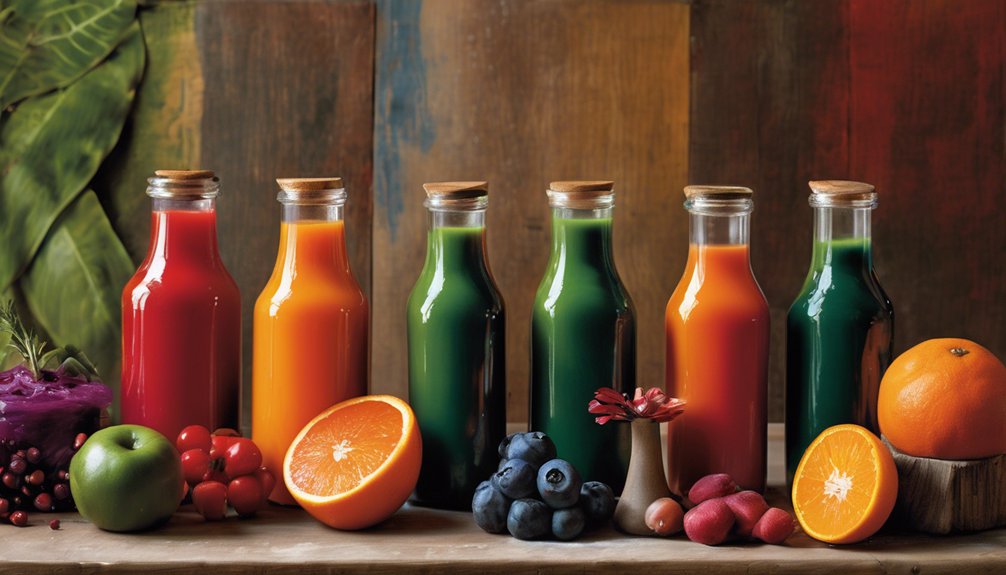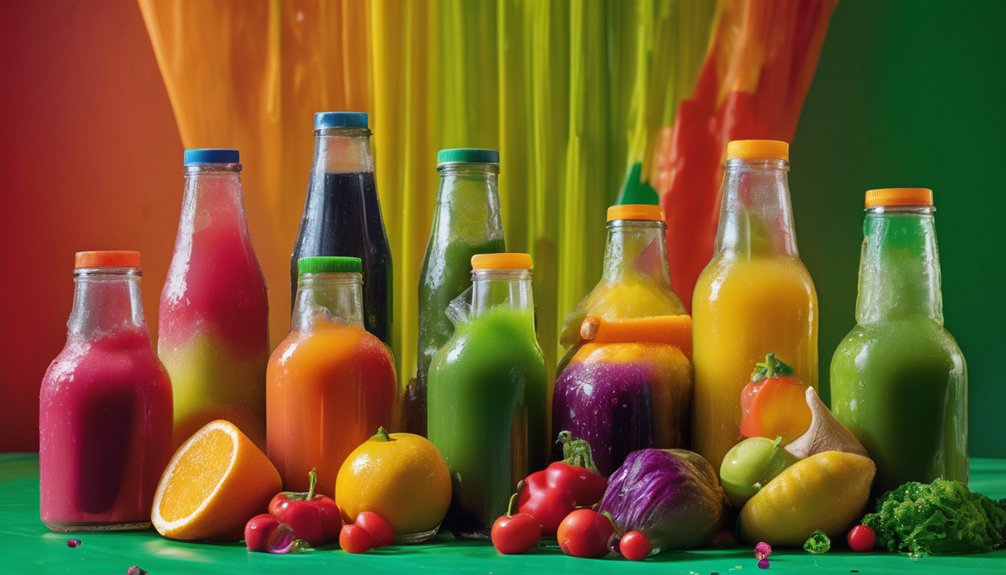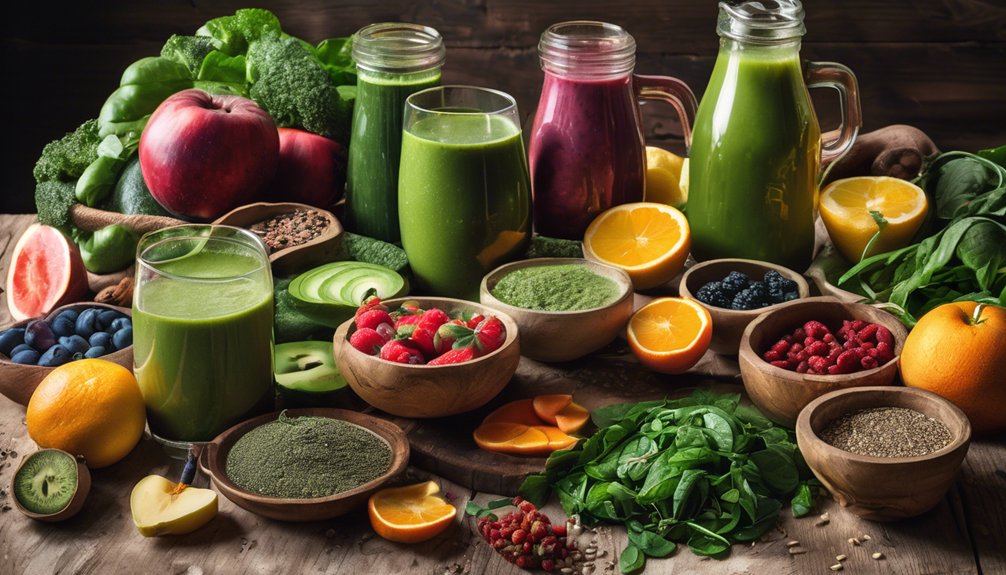Truth About Juice Cleanses
You might think juice cleanses are a quick fix for detoxing your body and boosting energy. While they can offer some short-term benefits, it's essential to look deeper into the potential risks involved. Nutrient deficiencies and blood sugar spikes are just a few concerns that could arise. So, what should you consider before jumping on the juice cleanse bandwagon? Understanding the nuances could change your perspective entirely.
Key Takeaways
- Juice cleanses offer a temporary energy boost but may lead to nutrient deficiencies due to lack of proteins and fats.
- Many participants experience improved digestion, but the high sugar content can spike blood sugar levels.
- While touted for detox benefits, juice cleanses are not a miracle solution and do not guarantee sustainable weight loss.
- Fiber-rich whole foods provide essential nutrients that juices lack, enhancing digestion and satiety.
- Alternatives like green smoothies, vegetable soups, and overnight oats can offer balanced nutrition without the drawbacks of juice cleanses.
What Is a Juice Cleanse?
A juice cleanse is a dietary regimen that involves consuming only fruit and vegetable juices for a set period, typically ranging from a few days to a week.
Understanding the juice cleanse basics helps you approach this regimen with clarity. During the cleanse duration, you'll primarily intake liquid nutrients, which many believe allows your digestive system to rest while flooding your body with vitamins and minerals.
However, it's important to note that a juice cleanse isn't a miracle solution; it's more about resetting your eating habits. If you're thinking about starting one, consider your lifestyle and any pre-existing health conditions.
This way, you can engage with the process genuinely and make informed choices about your health journey.
Potential Benefits of Juice Cleanses
Many people explore juice cleanses for their potential benefits, which can include increased energy levels, improved digestion, and enhanced skin health.
Many find that the detox benefits of a juice cleanse help eliminate toxins from their bodies, leaving them feeling lighter and more vibrant. You might notice an improvement in your digestive health, as the nutrients from fresh juices can support gut function and promote regularity.
Additionally, the vitamins and antioxidants found in fruits and vegetables may contribute to clearer, healthier skin.
While it's important to incorporate a variety of foods into your diet, a juice cleanse can serve as a refreshing reset, allowing you to focus on nourishing your body with wholesome ingredients.
Risks and Drawbacks of Juice Cleanses
While juice cleanses may sound appealing, they come with several risks and drawbacks that you should consider.
Many people experience health implications, such as nutrient deficiencies, due to the lack of essential proteins and fats in these cleanses. Your body also undergoes metabolic effects, which can lead to fatigue, dizziness, and irritability as it adjusts to a sudden drop in caloric intake.
Additionally, the high sugar content in juices can spike your blood sugar levels, causing potential long-term health issues. You might feel lighter initially, but these cleanses often don't provide sustainable weight loss.
Before diving in, it's crucial to weigh these risks against the potential benefits to make an informed decision about your health journey.
Nutritional Considerations
When considering juice cleanses, it's important to evaluate their nutritional aspects. While juices can be rich in vitamins and minerals, they often lack nutrient density compared to whole fruits and vegetables.
Many of the beneficial compounds, like antioxidants, are more abundant in the fiber-rich pulp, which you miss out on during a cleanse. Fiber content plays a crucial role in digestion and overall health, helping you feel full and satisfied.
Without adequate fiber, you might experience hunger pangs or digestive issues. Balancing your intake with whole foods alongside juices can provide a more comprehensive nutrient profile.
Alternatives to Juice Cleanses
If you're looking to detoxify your body without resorting to juice cleanses, there are several effective alternatives worth considering. Smoothie alternatives can boost your nutrient intake while providing you with fiber, keeping you fuller for longer. Whole food options, like fruits, vegetables, nuts, and grains, also support your body's natural detox processes.
Here's a quick comparison:
| Alternative | Benefits | Tips |
|---|---|---|
| Green Smoothies | Rich in vitamins & minerals | Add spinach or kale |
| Fruit Bowls | High in antioxidants | Mix berries & nuts |
| Vegetable Soups | Hydrating & nutritious | Use fresh herbs for flavor |
| Overnight Oats | Fiber-rich & filling | Top with fruits & seeds |
| Herbal Teas | Supports digestion & detox | Choose caffeine-free options |
Explore these options and find what resonates with you!
Tips for a Safe Juice Cleanse Experience
To ensure a safe juice cleanse experience, it's essential to approach the process with mindfulness and preparation. Here are some preparation tips to help you along the way:
- Consult a healthcare professional: Make sure you're healthy enough for a cleanse.
- Start with whole foods: Gradually eliminate processed foods a few days before starting.
- Stay hydrated: Drink plenty of water to support your body during the cleanse.
- Plan your post-cleanse recovery: Introduce solid foods slowly to ease your digestive system back into its routine.
Frequently Asked Questions
Can Juice Cleanses Help With Weight Loss Long-Term?
Juice cleanses might give you short-term results, but they often lack sustainability. For long-term weight loss, focus on building sustainable habits, like balanced eating and regular exercise, that support your overall health and well-being.
Are There Specific Fruits and Vegetables Recommended for Juice Cleansing?
Bright, juicy oranges contrast with leafy greens like kale. For your juice cleanse, consider recommended produce such as apples, beets, and cucumbers. These juice combinations nourish you, providing essential vitamins and minerals for a refreshing experience.
How Often Should Someone Do a Juice Cleanse?
You should consider frequency guidelines for juice cleanses, typically doing them once a month. The optimal duration is usually three to five days, allowing your body to reset without overwhelming it. Listen to your body's needs.
Can Juice Cleanses Affect Medication or Health Conditions?
When you mix medications with juice, it's like dancing on a tightrope; one misstep could lead to health contraindications. Always check for juice interactions with your doctor to ensure your safety and well-being.
What Should I Do if I Feel Unwell During a Cleanse?
If you feel unwell during a cleanse, focus on symptom management and hydration strategies. Drink plenty of water, listen to your body, and consider light snacks if needed. Your well-being should always come first.
Conclusion
In the quest for a quick health boost, juice cleanses can seem appealing, yet they often overlook essential nutrients your body craves. While you might feel energized initially, those high sugar levels and lack of fiber could leave you hungry and depleted. Instead of relying solely on juices, consider a balanced approach with whole foods for sustainable health. By combining the best of both worlds, you can enjoy short-term benefits without compromising your long-term well-being.












